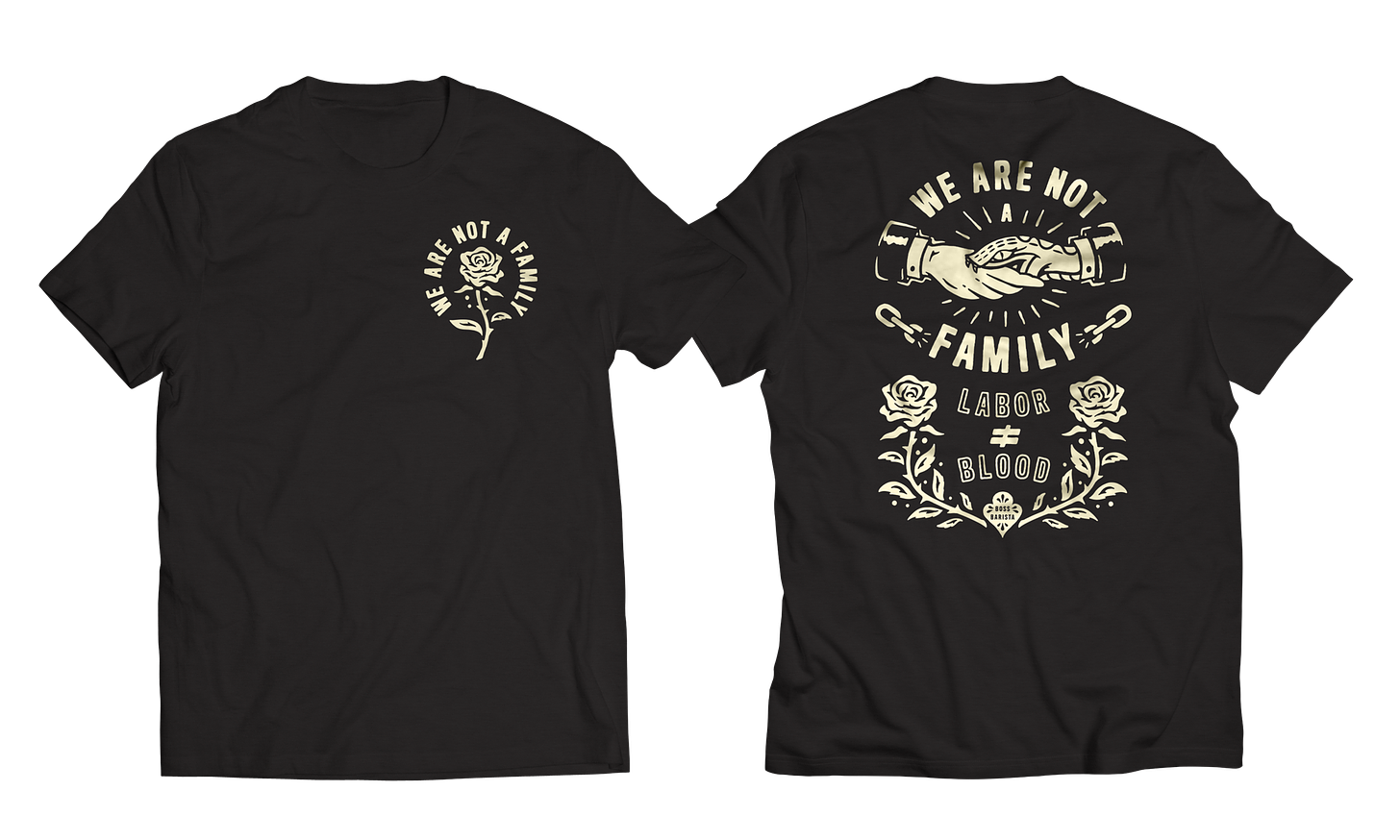Boss Barista is a weekly newsletter and podcast series about workplace equity and employee empowerment in coffee and beyond. If you’re not already subscribed, welcome! I’m glad you found your way here. Before you go, sign up, will ya? Here’s a cute little button to make it easy:
If the following piece resonates with you, consider donating to my Patreon. Pledges of any size help me produce these stories, and your support is gratefully received.
Shirts are back! We’re doing a third run of “We Are Not A Family Tees” in new colors! We also have a limited number of back-stock tees from the second run, which are available here. Scroll down to learn more.
I don’t believe in dream jobs.
I believe that people can excel in jobs they’ve dreamed about, and I believe that people can be happy within their chosen professions. But I think the term “dream job” can be limiting (and even actively harmful), and an unhelpful way to plan your next career steps. A dream job may be the supposed end point, but you have no way of knowing how many steps it’ll take to get there—and it could take years before you figure out the clues.
Instead, I think it’s better and more useful to start not with an end goal but within yourself. What are you good at? Which tasks or projects highlight your skills and make you feel satisfied, and how can you build a job around them?
In the latest episode of the Boss Barista podcast, I re-aired a conversation with Erica Chadé, a coffee educator and one of my favorite people on the internet, and towards the end of the interview, I asked them about their future:
Ashley: What does the future look like for you in coffee? What would you like to be doing in the next year, two years?
Erica: I would love to get back into a space where I can use more of my skills at my current job. My role is to be a really good barista and I can do that, but like you’ve been saying throughout this podcast, I usually am looking at the big picture.
I’m in a frustrating place of like, I can’t affect the big picture. I can’t even speak into the big picture. So I would want to get back into a role where I can have an effect on the big picture of what’s going on. That’s the thing that comes to mind. I don’t really have a specific job or job description I think right now, but I would love to just be able to have a more holistic approach to my work.
There are a lot of problems with the way we currently talk about work and employment. From when we’re young, we’re told we need to find our one fixed “dream job,” and that that job is meant to represent who we are. We’re not expected to change, grow, or discover new things about ourselves. And we’re certainly not encouraged to double back or find new paths in later life, or to
express dissatisfaction when a job we thought we’d love ends up being far from what we’d imagined.
What I liked about Erica’s response is its openness and feeling of possibility. With their skills and goals, there are 100,000-odd things they could do—they simply don’t have to think within the limits of one strict career path or trajectory. Instead, by starting with and identifying her own wants and preferences, she can figure out what works best for her.
More of us can take a page from Erica when planning our careers—particularly since the current model isn’t working. The idea of the “dream job” isn’t just high-stakes; it’s often elusive. Only one in five residents of the United States reports having their dream jobs, so what do we say to the other four who don’t? What sort of advantages did folks who got their dream jobs receive that others didn’t? And for those who managed to find their dream jobs, only to step away from them later, what hurdles were in place—like racist and sexist bosses, unwelcoming work cultures, or limited pay—that made thriving in a “dream” position untenable?
The way we talk about work doesn’t usually allow for this kind of nuance. Our society is so singularly goal-focused that workers aren’t encouraged to think about their career paths critically, or to contextualize their surroundings. Instead, we ask people to chase prizes without stopping to ask: Why are you pursuing this goal in particular? Why do you want this?
The reality is that, for the majority of us, career goals aren’t static—as we grow and change as individuals, so do our interests, our curiosities, and our working preferences. The dream job question doesn’t just forestall that growth and impose stagnation—it also operates with the assumption that we are all supposed to be devoted to and fulfilled by the work we do, which we don’t have to be. The hunt for your dream job is a form of striving that’s very convenient for employers looking to profit from your above-and-beyond effort and sacrifice. And given that our current capitalist economic system certainly doesn’t provide every worker with satisfying, high-paid work, “dream jobs” are so often unfulfilled promises.
With these conditions in mind, it shouldn’t be radical to say that your self-worth isn’t dependent on finding a perfect job, and that you can be a fully capable, talented, whole person who is also meh about their job and doesn’t give it much thought. What’s wrong with a “just okay” job if it allows you the flexibility to pursue hobbies, spend time with friends and family, or otherwise live how you want to live?
I never dreamed of becoming a writer, and I’m not sure I’d even say writing makes me happy. But I get to work for myself, set my own schedule, and work at nighttime, when my creativity and ideas spike (true to form, I’m writing this at midnight). Writing is not my dream job, but it allows me to exercise skills that satisfy me and to create an environment I enjoy.
Most of us would be better off ignoring the played-out dream job mythology. Instead, focus on what you like and what gives you satisfaction—and if you can, find a job that allows you to exercise some of your interests while being the whole person you wish to be.
We’re doing a third round of t-shirts! We only do limited runs so get yours now before the online store closes. We print to order, so it’ll take 3-4 weeks before your tee arrives. If you want a tee sooner, we have a very limited selection of backstock tees from previous runs.
For this run, we’ll have tees available in Black, Olive, and Orchid. Get yours today!
Hold up! You made it to the bottom of this article! Thank you so much for reading! If you could do any or all of the following things, that’d be incredibly helpful!
Click the ‘heart’ at the bottom to say you liked this article!
Consider checking out my Patreon!
Share this with a friend, on your social media, anywhere! Here’s a button for you to do so!






